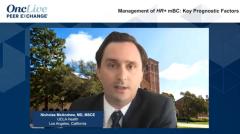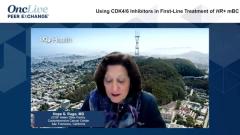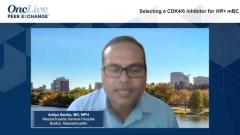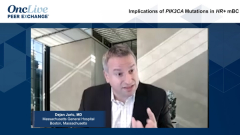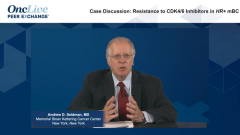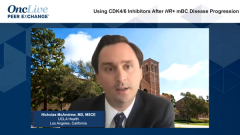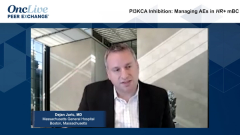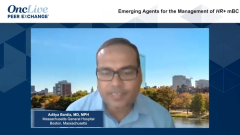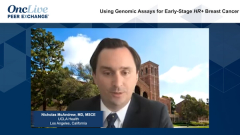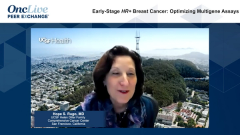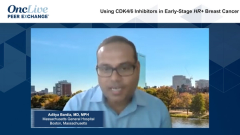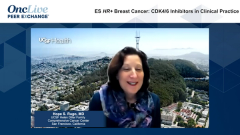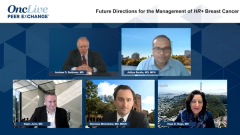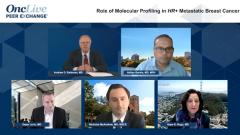
Future Directions for the Management of HR+ Breast Cancer
Andrew D. Seidman, MD; Aditya Bardia, MD, MPH; Dejan Juric, MD; Nicholas McAndrew, MD, MSCE; and Hope S. Rugo, MD, share closing thoughts on the current and future treatment landscape for the management of HR+ breast cancer.
Episodes in this series

Andrew D. Seidman, MD: I want to thank all of you for a really rich and informative discussion. Before we conclude, I would like to give you a chance to share some final thoughts on where we are and where we may be in the next 2 years in managing ER [estrogen receptor]-positive HER2-negative breast cancer. Dejan, do you want to start us off?
Dejan Juric, MD: Yes. I would say that we’re starting to move away from purely clinical parameters, such as stage, grade, or a simple understanding of where the disease is, toward biology. To this end, mutation profiling is only a first step. Understanding whether there’s a PIK3CA mutation in the tumor is literally the tip of the iceberg. We should aggressively pursue full profiling of tumors at the time of diagnosis, with serial profiling as the patient proceeds through therapy, which hopefully, with incorporation of machine learning approaches, will help us develop decision support systems that can help busy oncologists make these decisions in a more comprehensive way using the totality of data.
Andrew D. Seidman, MD: Nick, any parting thoughts on our topic for today?
Nicholas McAndrew, MD, MSCE: Yes, we’ve certainly given ourselves a lot to think about. I can’t help but think about the first hypothetical patient we discussed today who had progressed on an adjuvant aromatase inhibitor. We’re starting to enter an era of ongoing clinical trials where we’re trying to explore that window of opportunity prior to surgery in patients who have hormone-positive HER2-negative breast cancer to try to understand, exactly as Dejan mentioned, the biology of the disease and try to identify patients who have either de novo or quickly acquired resistance to hormone-based therapy, as that’s the mainstay of adjuvant therapy in this setting.
It’s important to try to encourage participation in these clinical trials, especially in that we’re not often thinking about neoadjuvant therapy for our patients who have hormone-positive disease. We’re missing a big opportunity to really understand biology, not just with these simple, changing Ki-67 assays, but more complex molecular interactions that will ultimately influence endocrine resistance. I’m excited to see the field move in that direction, as it’s going to help us cure more patients.
Andrew D. Seidman, MD: Hope, as an I-SPYer, you’re married to the neoadjuvant setting for discovery and translation. Is there anything you want to add to what’s been said about molecular biology, liquid biopsy, or exploiting the neoadjuvant setting? Are you optimistic about where this is going to take us?
Hope S. Rugo, MD: I’m very optimistic. Although very complicated, the ADAPT hormone receptor-positive trial has been quite fascinating, mainly for the concept that you could do a lead-in with endocrine therapy and potentially understand which patients have endocrine-sensitive disease and could avoid chemotherapy. That’s a very interesting idea that we need to try to explore. It’s very tough to do that in all community settings where you would give 2 to 3 weeks of endocrine therapy and repeat Ki-67. We’d have to decide if we need central resources.
But neoadjuvant endocrine therapy overall may be a very good way to understand which patients could potentially avoid chemotherapy based on the data we have from numbers of trials over time. Then I agree that we can differentiate further by ctDNA [circulating tumor DNA]. The question is whether we can use it to more personalize therapy and not to just give what we already know didn’t work in that patient population.
There was a fascinating poster presented at the 2021 ASCO [American Society of Clinical Oncology annual meeting]. I don’t exactly know how they did it, but they did spinal fluid evaluation in all these people with early stage triple-negative breast cancer. They all got LPs [lumbar punctures]. They showed that if you had ctDNA for a tumor in the CSF [cerebrospinal fluid], those patients did terribly, and they all got brain metastases. We don’t know how to intervene in that group yet, but it does show you the power of looking at some of these other features that are so important in the early stage setting so that we don’t just keep treating everybody with everything.
Andrew D. Seidman, MD: This will challenge our IRBs [institutional review boards] to think outside of the box when we make these crazy proposals to them.
Hope S. Rugo, MD: Absolutely.
Andrew D. Seidman, MD: Aditya, last words?
Aditya Bardia, MD, MPH: Precision medicine. I completely agree with what’s been said before. In the next 5 years, we’re going to see more precision medicine in breast cancer. If you look at breast cancer, it’s probably the poster child for precision medicine with the use of endocrine therapy for ER-positive breast cancer. Then we’ve seen gene expression assays, genotyping, use of PI3-kinase inhibitors, and we’ll have additional assays as well to identify other actionable alterations. There’s also the concept of dynamic biomarkers for monitoring ctDNA or other blood-based biomarkers. It’ll be about the right drug for the right patient based on understanding tumor biology at the right time.
Andrew D. Seidman, MD: Excellent. I want to thank you for bringing your A game and expertise to this session. I want to thank our viewing audience for joining us. We hope you found this OncLive® Peer Exchange to be valuable and informative. Thank you.
Transcript Edited for Clarity


